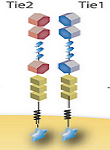|
|
|
Tie1, The Orphan Receptor No Longer in the Shadows
|
|
|
|
|
|
|
|
|
|

|
|
|
Nikolett M. Biel
|
|
|
|
University of Florida College of Medicine
|
Department of Pathology, University of Florida College of Medicine, Gainesville, FL 32610, USA
|
|
nmolnar@ufl.edu
|
|
|
|
|
|
|
|
|
|

|
|
Angiogenesis, the formation of new blood vessels from pre-existing ones, occurs during physiological conditions such as wound healing, pregnancy and the menstrual cycle. It is also a fundamental process in pathological conditions such as tumor development, ocular disease, diabetes, atherosclerosis and arthritis. Angiogenesis as a therapeutic target (especially Vascular Endothelial Growth Factor (VEGF) inhibitors) has been heavily pursued in numerous cancer settings with promising results yet fallen short of its expectations. The discovery of the endothelial cell specific Angiopoietin/Tie axis and its role in normal and pathological angiogenesis led to the development of second-generation anti-angiogenic agents. Most of the effort has been to target the pro-angiogenic factor Ang-2 and its receptor Tie2. The present research highlight focuses on a study by D’Amico et al.,.....
|
|
|
|
|
|
|
|

|
|